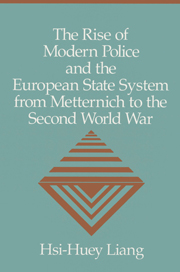Book contents
- Frontmatter
- Contents
- Abbreviations used in footnotes
- Preface
- Introduction: How do we define modern police?
- 1 Five national police styles in response to popular unrest in the nineteenth century
- 2 Modern police and the conduct of foreign policy. The French police and the recovery of France after 1871
- 3 International police collaboration from the 1870s to 1914 Professional contacts between police administrations
- 4 War and revolution, 1914–1922
- 5 The threat of totalitarianism. Nazi Germany's bid for European hegemony
- Epilogue
- List of archival files consulted
- Index
3 - International police collaboration from the 1870s to 1914 Professional contacts between police administrations
Published online by Cambridge University Press: 07 May 2010
- Frontmatter
- Contents
- Abbreviations used in footnotes
- Preface
- Introduction: How do we define modern police?
- 1 Five national police styles in response to popular unrest in the nineteenth century
- 2 Modern police and the conduct of foreign policy. The French police and the recovery of France after 1871
- 3 International police collaboration from the 1870s to 1914 Professional contacts between police administrations
- 4 War and revolution, 1914–1922
- 5 The threat of totalitarianism. Nazi Germany's bid for European hegemony
- Epilogue
- List of archival files consulted
- Index
Summary
Professional contacts between police administrations
While France, Russia, Germany, and Switzerland maneuvered in the 1870s and 1880s to absorb the consequences of the 1870 war and the assassination of Alexander II, Austria-Hungary diligently continued to foster professional contacts between the police authorities of different countries. Besides the exchange of police journals and the conclusion of agreements on hot pursuit of fugitive suspects, Vienna also promoted comparative studies of police laws and organizations. In 1869 Austria inquired with a number of governments about their laws concerning the transportation of women across national boundaries for purpose of prostitution. While the governments of Prussia and Mecklenburg-Schwerin obliged with noncommittal statements concerning their laws on emigration, the answer by the Romanian government, which was both polite and evasive, exposed the purpose of the Austrian demarche for what it was: an official communication on a police question nobody believed could be resolved, and which was made largely for the sake of the communication itself:
Having conveyed to the ministry of interior the question contained in the note of 14 December of last year which you were good enough to address to me, the ministry now informs me that the assistance which your esteemed agency has requested touches on a matter of domestic administration so that the Princely government finds itself unable to accede to it. Nevertheless, in the interest of humanity and the advancement of public morality, the government of His Highness, moved by the same sentiments as the Imperial and Royal government, is presently engaged to add yet more serious measures to those already in force so as to safeguard public morality.
- Type
- Chapter
- Information
- The Rise of Modern Police and the European State System from Metternich to the Second World War , pp. 151 - 181Publisher: Cambridge University PressPrint publication year: 1992

